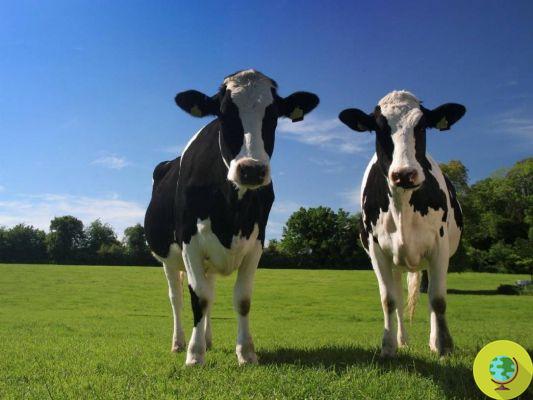
Introduce algae into cow feed to reduce methane emissions by 99%. this is the idea, considered revolutionary, to stem the serious problem of pollution linked to the breeding and consumption of meat by humans
He is about to end up run over, his mother saves him
Introduce the seaweed in the feeding of cows for reduce methane emissions 99%. this is the idea, considered revolutionary, to stem the serious problem of pollution linked to the breeding and consumption of meat by humans.
The researchers of the Università James Cook of Queensland, in Australia, they found that adding a small amount of dried algae (just 2%) to their normal grass-based diet can nearly eliminate methane emissions.
Lo study is based on the experience of a Canadian farmer who discovered in 2012 that i cattle who consumed algae not only were generally more breasts compared to the others but enjoyed a longer mating cycle. Researchers Rob Kinley and Alan Fredeen later confirmed the results, arguing that even minimal consumption of algae drastically reduced methane emissions.
Further confirmation also comes from the Australian study, led by prof. Rocky De Nys in partnership with the Commonwealth Scientific and Industrial Research Organization.
The research team tested 20 species of algae examining their reaction with the bacteria present in the stomachs of cows. They found that a species called Asparagopsis Taxiformis was particularly effective in reducing cows' methane emissions, and if it made up only 2 percent of the animal diet, it was able to recoverto reduce emissions by 99 percent.
The emissions related to the consumption of meat are those that have the greatest impact on the health of the planet. One study even estimated that the meat industry pollutes more than the oil multinationals.
Il methane, as we know, it is also released from the flatulence of cattle, as a by-product of their digestion. Cows, with the help of the bacteria present in the stomach, digest food through a process called fermentation enterica, which allows them to have a diet based also on cellulose. However, this involves the production of methane in large quantities, equal to 200-500 liters per day per animal.
READ also:
- FARMING: THE MEAT INDUSTRY POLLUTES MORE THAN OIL MULTINATIONALS, THE STUDY
- DECREASE IN MEAT CONSUMPTION BY 19%: SO THE USA SAVED THE EMISSIONS OF 39 MILLION CARS
- EATING LESS MEAT IS THE ONLY WAY TO TRULY FIGHT CLIMATE CHANGE. THE NEW STUDY OF IPSOS
- 10 REASONS TO ELIMINATE AT LEAST RED MEAT FROM YOUR DIET
Of course, change the diet of the cows certainly does not seem to be the best solution for the planet. The breeding of cattle for food, both for meat and for milk, presupposes other polluting processes that certainly cannot be solved by adding algae.
Suffice it to say that breeding also produces large quantities of dioxide di carbon, resulting from the cutting of forests to convert land to pasture and crops for feed. On the contrary, the fruit production, vegetables and legumes do not generate much pollution.
Also in terms of health il best before date of meat it should be minimized, if at all avoided. Only in this way could the planet really recover from the climatic catastrophe it has plunged into.
Francesca Mancuso


























